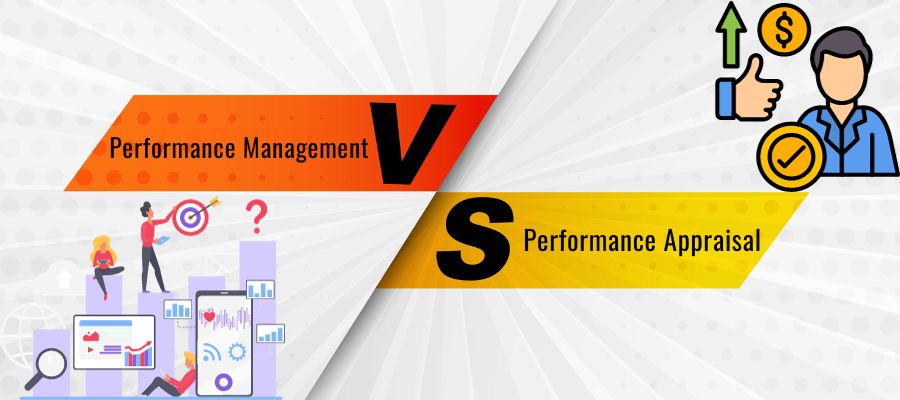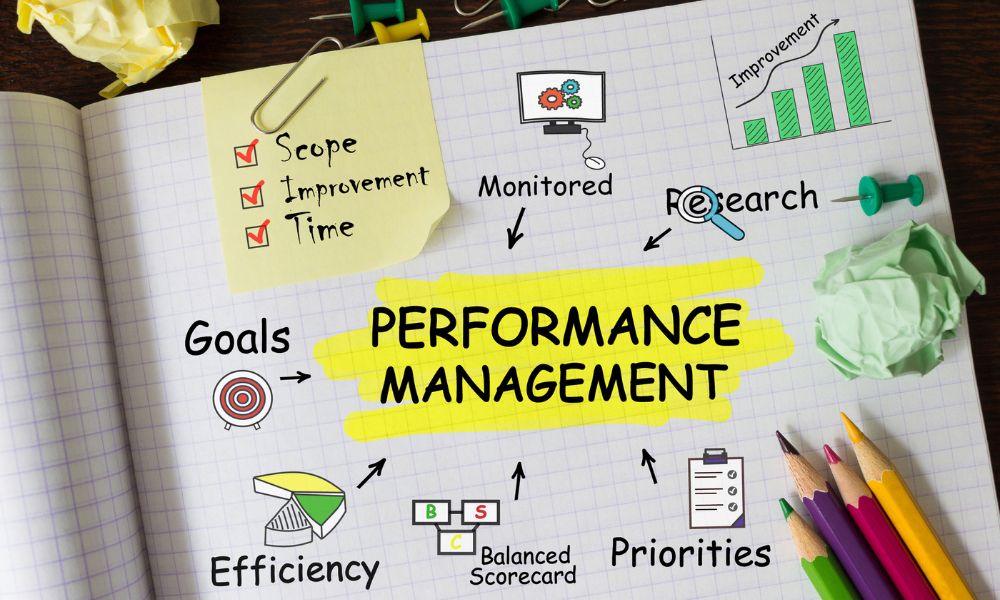Performance management is not merely a routine administrative task; it is a dynamic and strategic process designed to enhance employee performance, boost organisational success, and foster a culture of continuous improvement.
Performance management ensures that employees are aligned with the company’s mission and objectives through a structured approach that includes goal setting, regular evaluations, and ongoing development.
1. Strategic Alignment: Performance management aligns individual and team goals with the broader strategic objectives of the organisation. This alignment ensures that every employee’s efforts contribute to the company’s overall success.
2. Continuous Improvement: Performance management facilitates ongoing improvement by providing a framework for regular feedback and assessment. It empowers employees to identify areas for growth, address challenges, and continuously refine their skills.
What Is Performance Management?

Performance management is a multifaceted process encompassing various stages, from goal setting to continuous feedback and professional development. At its core, it involves creating a framework that allows individuals and teams to excel and contribute optimally to the organisation’s success.
1. Goal Setting: The process begins with setting Specific, Measurable, Achievable, Relevant, and Time-Bound (SMART) goals. These goals serve as benchmarks for performance and provide a clear roadmap for employees.
2. Ongoing Feedback: Performance management emphasises the importance of regular feedback, encouraging open communication between managers and employees. This ensures that employees receive timely guidance and recognition for their efforts.
How Performance Management Works?

The effectiveness of management lies in its cyclical nature, where each stage feeds into the next. Establishing a robust framework for digital transformation is crucial in setting expectations and aligning organizational goals with technological advancements.
From setting expectations to evaluating performance and providing feedback, this process is a continuous loop that adapts to the evolving needs of employees and the organization, leveraging a framework for digital transformation to stay ahead in the rapidly changing landscape.
1. Performance Evaluation: Periodic evaluations assess employee performance against established goals. This allows for identifying strengths, areas for improvement, and opportunities for skill development.
2. Professional Development: Based on the evaluation, management identifies avenues for professional development. Whether through training programs, mentorship, or other initiatives, employees are supported in their quest for continuous growth.
Benefits of Performance Management

The advantages of a robust management system extend beyond individual accomplishments to impact the overall organisational health. Recognising these benefits is crucial for organisations creating a thriving work environment.
1. Enhanced Productivity: Clear goals and regular feedback motivate employees, increasing productivity and efficiency.
2. Talent Identification: Performance management helps identify and nurture high-potential employees, ensuring a pipeline of skilled and motivated talent.
3. Employee Engagement: By fostering open communication and recognition, management contributes to higher employee engagement and job satisfaction.
Difference Between Performance Management and Performance Appraisal

While both terms are related to evaluating employee performance, understanding the differences between management and performance appraisal is key to implementing a comprehensive and effective system.
1. Performance Management: A continuous and proactive approach focused on ongoing development, coaching, and goal alignment.
2. Performance Appraisal: A periodic, retrospective assessment typically assigning ratings based on past performance.
Performance Management Process: Best Practices
Adopting best practices ensures that the management process is not just a formality but a dynamic tool for organisational success.
1. SMART Goals: Ensure that goals are Specific, Measurable, Achievable, Relevant, and Time-Bound.
2. Regular Check-Ins: Schedule regular one-on-one meetings to provide continuous feedback and address concerns promptly.
3. Employee Involvement: Encourage employees to actively participate in goal-setting and self-assessment to enhance ownership and accountability.
How Does Performance Management Improve Company Culture?

The positive impact of performance management on company culture is substantial, creating an environment that values transparency, collaboration, and employee development.
1. Transparency: Regular feedback sessions and evaluations promote transparency, creating an environment where all expectations and accomplishments are clear.
2. Accountability: A performance-driven culture instils accountability, encouraging employees to take ownership of their roles and contribute to the organisation’s success.
3. Recognition and Rewards: Acknowledging and rewarding exceptional performance reinforces a culture that values and celebrates individual and collective achievements.
Continuous Improvement and Adaptability
One of the hallmarks of effective management is its capacity to foster a culture of continuous improvement and adaptability within an organisation. Employees are encouraged to evolve with the changing demands of their roles and the industry by emphasising ongoing feedback and development.
Performance management catalyses identifying emerging trends, evolving skill requirements, and adapting strategies to stay ahead of the curve.
1. Adapting to Change: Organisations must be agile and responsive in a rapidly changing business landscape. Performance management equips employees with the skills and mindset to navigate uncertainties, fostering a resilient workforce.
2. Innovation and Creativity: Continuous improvement often leads to increased innovation and creativity. When employees are empowered to push their boundaries and experiment with new ideas, the organisation benefits from a dynamic and forward-thinking approach.
Data-Driven Decision Making
An often underestimated benefit of performance management lies in its ability to provide valuable data for informed decision-making. Through regular evaluations and assessments, organisations accumulate a wealth of performance-related data that can be analysed to identify trends, strengths, and areas for improvement.
1. Identifying Patterns: Performance data allows organisations to identify patterns in employee performance, helping to recognise factors contributing to success or potential challenges that need addressing.
2. Strategic Resource Allocation: Armed with insights from management, organisations can strategically allocate resources, such as training budgets and mentorship programs, to areas that will have the most significant impact on overall performance and organisational goals.
Employee Empowerment and Engagement

Performance management is not solely a top-down process; it empowers employees by involving them in goal-setting, self-assessment, and career development. This sense of ownership fosters a deeper connection between employees and the organisation, leading to increased engagement and commitment.
1. Goal Ownership: When employees actively participate in setting their goals, they are more likely to feel a sense of ownership and commitment to achieving them.
2. Career Development: Performance management facilitates conversations about career development and growth opportunities. This proactive approach to employee development enhances job satisfaction and retention.
How Walter And Associates Can Help You
With their wealth of experience in performance management consulting, Walter and Associates, an innovative IT solutions company, bring a tailored approach to organisations seeking to enhance their management strategies.
1. Customised Solutions: Through thoroughly understanding your organisation’s unique needs, Walter and Associates provide tailored solutions that align with your goals.
2. Technology Integration: Leveraging cutting-edge performance management software, they streamline processes, enhance efficiency, and provide real-time insights.
3. Expert Guidance: The team at Walter and Associates offers expert guidance on implementing best practices, ensuring that your management system catalyses organisational success.
Conclusion
In conclusion, integrating effective performance management practices is not just a managerial duty but a strategic imperative for organisations aiming for sustained success. With its emphasis on continuous improvement, goal alignment, and employee development, management contributes to individual growth and the creation of a thriving company culture.
The partnership with Walter and Associates further ensures that your organisation is equipped with the tools and expertise needed to successfully navigate the dynamic landscape of management. Embrace these principles and witness your organisation’s transformation into a high-performance powerhouse.






















